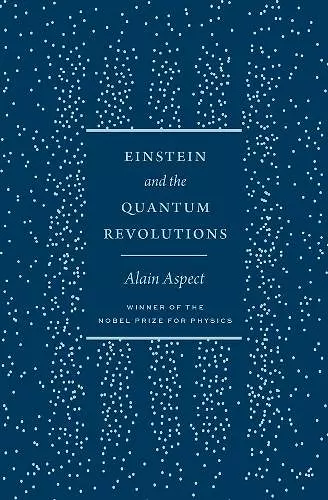Einstein and the Quantum Revolutions
Alain Aspect author Teresa Lavender Fagan translator
Format:Hardback
Publisher:The University of Chicago Press
Published:1st Nov '24
Should be back in stock very soon

A Nobel laureate offers a brief lesson on physics’ biggest mystery, accessibly explaining the two quantum revolutions that changed our understanding of reality.
At the start of the twentieth century, the first quantum revolution upset our vision of the world. New physics offered surprising realities, such as wave-particle duality, and led to major inventions: the transistor, the laser, and today’s computers. Less known is the second quantum revolution, arguably initiated in 1935 during a debate between giants Albert Einstein and Niels Bohr. This revolution is still unfolding. Its revolutionaries—including the author of this short accessible book, Nobel Prize–winning physicist Alain Aspect—explore the notion of entangled particles, able to interact at seemingly impossible distances. Aspect’s research has helped to show how entanglement may both upend existing technologies, like cryptography, and usher in entirely new ones, like quantum computing. Explaining this physics of the future, this work tells a story of how philosophical debates can shape new realities.
“[A] beautifully produced little book. . . . The book’s brevity and clear writing . . . make for an interesting overview of quantum ideas and their history. . . . Slim but not slight. . . . The stories here are beguiling.” -- Robyn Arianrhod * Australian Book Review *
"The French Nobel laureate Aspect explains there has been not just one quantum revolution but two. The second is ongoing, with the results being felt in areas such as computing and communications. This, says Aspect, is the science of the future; the full potential of 'entangled particles' which interact at distance is still unfolding." * New Statesman *
"French physicist Aspect is a pioneer in ‘quantum entanglement’—connections between the quantum properties of subatomic particles that are preserved even at distances too great for signals to travel at light speed. He shared the 2022 Nobel Prize in Physics for this work, which underpins quantum computers and other technologies. With his book on the foundations of quantum mechanics being released, Aspect . . . [tells] why he sees parallels between physics and magic, why Einstein doesn’t get all the credit he deserves and how there were two quantum revolutions, not one." -- Ron Cowen * Nature *
"Nobel Prize–winning physicist Aspect offers a brisk . . . overview of how Albert Einstein set off two twentieth-century upheavals in physics. In 1909, Einstein resolved scientific debate over the nature of light by proposing it 'was both a particle and a wave,' Aspect explains, noting that the discovery underpinned the development of computers and 'lasers that enable the processing and transmission of information' through optical fibers. The second revolution followed Einstein’s 1935 postulation that, according to quantum mechanics, there are circumstances under which two subatomic particles can be 'entangled' and act on each other regardless of the distance separating them. Aspect recounts how this idea remained the purview of abstract philosophical inquiry until the 1970s, when he and other physicists began developing techniques to work with entangled photons and paved the way for research that promises to produce quantum computers capable of performing calculations in a fraction of the time current computers require. Aspect does a solid job of covering how Einstein’s innovations have changed the world. . . . This intrigues." * Publishers Weekly *
"Aspect's work was fundamental to showing that quantum theory really did do away with local reality—that entangled quantum particles were genuinely able to effectively communicate (even though we can't control what they communicate) instantaneously at any distance. . . . For entanglement groupies like me, anything about the subject is worth having, and I'm glad to be able to read (translated from the French by Fagan) some words from the great man." -- Brian Glegg * popularscience.co.uk *
"It is nice to have a description of this very topical subject in the (translated) words of one of the main players in the field. . . . An easily digestible summary of the topic, in keeping with Einstein’s dictum to make everything as simple as possible but not simpler." * The Observatory *
“Fascinating. . . . Aspect’s beautiful experiment, completed in 1982, had a catalyzing effect on the scientific community. . . . The tiny spark of the second quantum revolution began to grow.” -- David Kaiser, author of "Quantum Legacies," from the foreword
“Lively, accessible, and brisk, Aspect’s book tells a compelling century-long story of groundbreaking discoveries. This is the perfect introduction to turn any reader into a quantum physics enthusiast.” -- Florian Carle, manager of the Yale Quantum Institute
“This book tells a magnificent story of science, in which experimentation made it possible to resolve philosophical debates.” * Pour la Science (France), on the French-language edition *
“Simple and excellent.” * L’affranchi de Chaumont (France), on the French-language edition *
“A slim book that authoritatively outlines the foundations and paradoxical consequences [of quantum mechanics].” -- Piero Bianucci * La Stampa (Italy), on the Italian-language edition *
“Retraces one of the liveliest scientific debates of the last century.” * Almanacco della Scienza (Italy), on the Italian-language edition *
"This book is a journey between theory and experiment, between mathematical models and reality, between science and technology." -- Massimo Inguscio, president emeritus of the Consiglio Nazionale delle Ricerche, Italy, from the foreword to the Italian-language edition
ISBN: 9780226832012
Dimensions: 203mm x 127mm x 15mm
Weight: 227g
112 pages